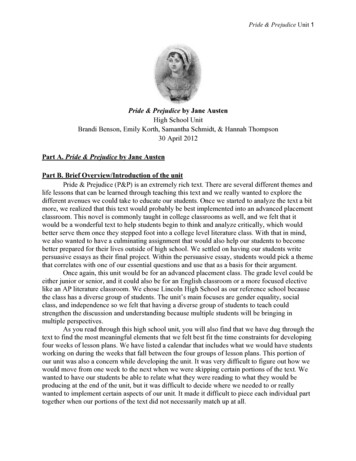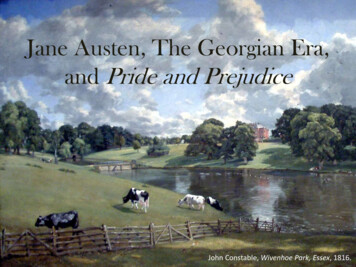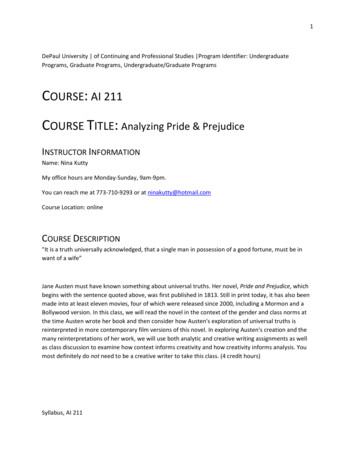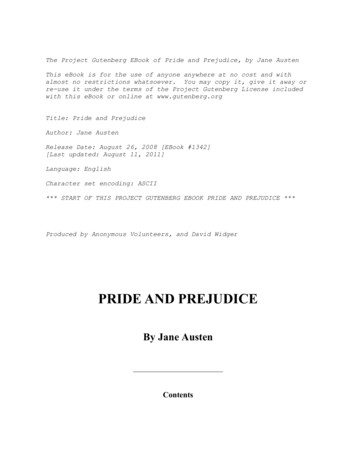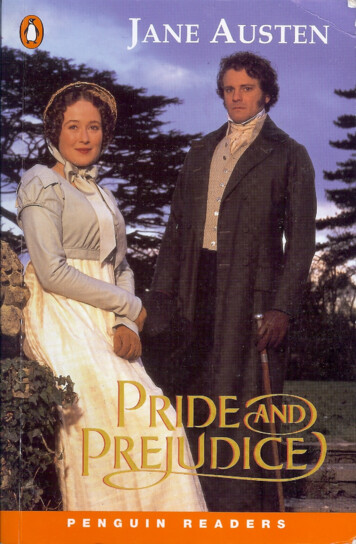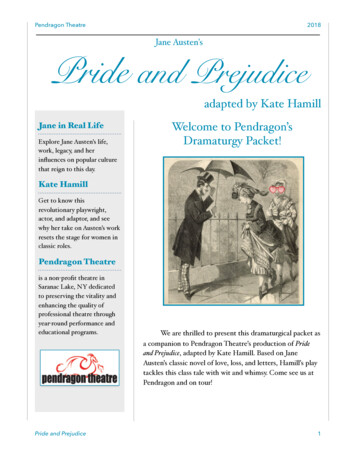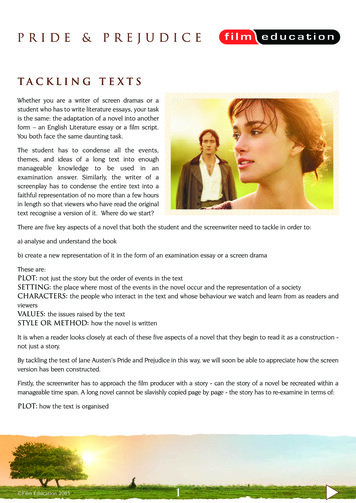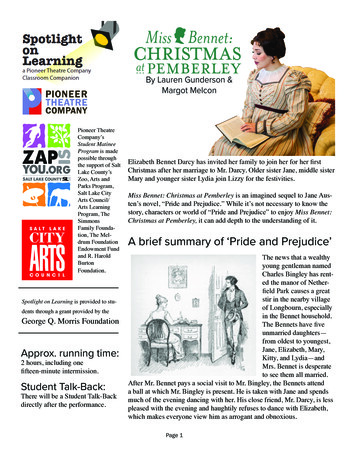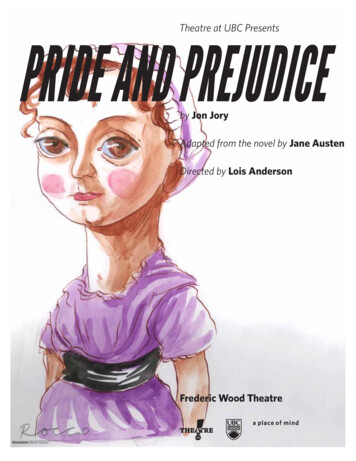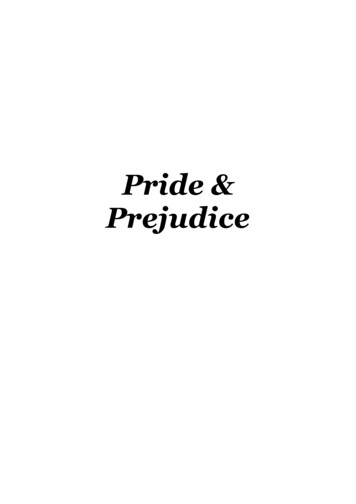
Transcription
Pride &Prejudice
2Pride & PrejudiceThe glorious world of Jane Austen is at last brought back to the big screen in all its romance,wit, and emotional force in Pride & Prejudice. Faithful to the setting and period of thebeloved novel and filmed entirely on location in the U.K, this is the first film version of the storyin 65 years.The classic tale of love and misunderstanding unfolds in class-conscious England near theclose of the 18th century. The five Bennet sisters – Elizabeth, or Lizzie (Keira Knightley), Jane(Rosamund Pike), Lydia (Jena Malone), Mary (Talulah Riley), and Kitty (Carey Mulligan) –have been raised well aware of their mother’s (Brenda Blethyn) fixation on finding themhusbands and securing set futures. The spirited and intelligent Elizabeth, however, strives tolive her life with a broader perspective, as encouraged by her doting father (DonaldSutherland).When wealthy bachelor Mr. Bingley (Simon Woods) takes up residence in a nearby mansion,the Bennets are abuzz. Amongst the man’s sophisticated circle of London friends and the influxof young militia officers, surely there will be no shortage of suitors for the Bennet sisters. Eldestdaughter Jane, serene and beautiful, seems poised to win Mr. Bingley’s heart. For her part,Lizzie meets with the handsome and – it would seem – snobbish Mr. Darcy (MatthewMacfadyen), and the battle of the sexes is joined.Their encounters are frequent and spirited yet far from encouraging. Lizzie finds herself evenless inclined to accept a marriage proposal from a distant cousin, Mr. Collins (Tom Hollander),and – supported by her father – stuns her mother and Mr. Collins by declining. When theheretofore good-natured Mr. Bingley abruptly departs for London, devastating Jane, Lizzieholds Mr. Darcy culpable for contributing to the heartbreak. But a crisis involving youngestsister Lydia soon opens Lizzie’s eyes to the true nature of her relationship with Mr. Darcy.The ensuing rush of feelings leaves no one unchanged, and inspires the Bennets andeveryone around them to reaffirm what is most important in life.Universal Pictures presents in association with StudioCanal a Working Title production. Pride& Prejudice. Keira Knightley, Matthew Macfadyen, Brenda Blethyn, Donald Sutherland,Tom Hollander, Rosamund Pike, Jena Malone, and Judi Dench. Casting by Jina Jay. MusicSupervisor, Nick Angel. Music by Dario Marianelli. Hair and Make-Up Designer, FaeHammond. Costume Designer, Jacqueline Durran. Editor, Paul Tothill. Production Designer,Sarah Greenwood. Director of Photography, Roman Osin. Co-Producer, Jane Frazer.Executive Producers, Debra Hayward, Liza Chasin. Based on the novel by Jane Austen.Screenplay by Deborah Moggach. Produced by Tim Bevan, Eric Fellner, Paul Webster.Directed by Joe Wright.
3Pride & PrejudiceSynopsisIn a rustic corner of England at the end of the 18th Century, Mrs. Bennet hears exciting news.A single and wealthy young man has moved into the nearby manor at Netherfield Park. Withfive daughters and no fortune, she makes it her mission that he should marry one of them.Obligingly the newcomer, Mr. Charles Bingley, is immediately taken with eldest daughter Jane,the gentle beauty of the family, at the next boisterous ball. Unfortunately his even more eligiblefriend, handsome but aloof Mr. Fitzwilliam Darcy, has no inclination to lower himself amongprovincials. He declines to dance with Elizabeth Bennet, unaware she overhears his offhandinsult.An invitation from Bingley’s haughty sister inspires Mrs. Bennet to send Jane on horseback inthe rain so she will have to spend the night. Exceeding her mother’s hopes Jane falls ill, andElizabeth hurries to her. On closer acquaintance Darcy begins to admire lively, witty Lizzy,while it amuses her to nurse her poor impression of him.The arrival of the militia in town brings dashing Mr. Wickham to Elizabeth¹s attention, and intheir quick intimacy he reveals he has a history with Darcy and has suffered injustice from him.The Bennets also have an unwelcome visitor in pompous Mr. Collins, the relative who willinherit their home when Mr. Bennet dies but who offers to marry one of the girls. Deflected fromJane by Mrs. Bennet’s confident assertion she is about to become engaged, Mr. Collins fixeson Elizabeth.The two girls’ romantic fates hang on a ball at Netherfield, where Lizzy, disappointed by Mr.Wickham’s absence, blames Darcy, and the rest of the Bennets collectively expose themselveswith cheerful vulgarity. Immediately after, the Bingley party abruptly depart, leaving Janeheartbroken and Elizabeth indignant. She rejects Mr. Collins’ proposal amid domestic uproar.To her dismay, her friend Charlotte Lucas does, surprisingly, agree to marry Mr. Collins.Some time later Elizabeth visits the newlyweds and meets Mr. Collins’s benefactress, arrogantLady Catherine de Bourg. Lady Catherine is entertaining two young men, one of whom,embarrassingly, is Mr. Darcy, who stuns Elizabeth with a passionate but inept declaration oflove. She refuses him, accusing him of ruining Jane¹s happiness and Mr. Wickham’sprospects. They part furiously, but he writes her a letter which forces her to see events in adifferent light, particularly the perfidy of Wickham.Back home, Elizabeth attempts to intervene when madcap youngest sister Lydia is invited toBrighton on the heels of the departing militia, but her father laughs off her fears for the girl.Lizzy welcomes an escape, accompanying her respectable aunt and uncle on a tour of thePeak District. When they insist on visiting Darcy’s magnificent Derbyshire estate Pemberley,however, Lizzy is mortified to run into Mr. Darcy himself and is thrown into turmoil by his warmwelcome.Just as it seems the two may come to an understanding, a scandalous crisis erupts. Lydia has
4run away with Wickham. Anxious suspense turns to relief when a marriage is somehowarranged. Lydia and Wickham return triumphantly and she lets slip that Mr. Darcy wasresponsible for their good fortune and wedding. Now, when it may be too late, Elizabethrealises how much she loves him. The sudden return of Bingley, accompanied by Darcy, raiseshope that Elizabeth and Darcy can see past their pride and prejudices to a well-suited futuretogether.The ProductionAlthough dramatised for television several times (in 1938, 1952, 1967, 1980, and 1995), JaneAusten’s classic Pride and Prejudice has been a feature film only once before, in 1940,directed by Robert Z. Leonard and starring Laurence Olivier and Greer Garson. Now, Pride& Prejudice makes its triumphant return to the big screen for Working Title Films.The company’s co-chairman and producer Tim Bevan reflects, “People remember the two mostrecent television adaptations, but the only other film version, from 1940, emphasized romanticcomedy. Over the decades, Jane Austen’s central depiction of Lizzie and Darcy has beenappropriated as the core of many other films – including a couple of our productions (BridgetJones’ Diary and Bridget Jones; The Edge of Reason). We felt that it was time to bringAusten’s original story, concentrating on Lizzie, back in all its glory to the big screen foraudiences everywhere to enjoy.”Producer Paul Webster concurs, noting, “Pride and Prejudice has provided the template to somany romantic comedy movies that it comes as a surprise that no film proper has been madefor 65 years. The two BBC versions are seminal -- the second one was the most successfulBBC drama ever – but we were intent on making a big-screen version, one that doesn’tconform to the television drama stereotypes of a perfect clean Regency world.”Executive producer Debra Hayward comments, “Director Joe Wright’s previous work, includingCharles II: The Power & the Passion had really impressed us. We met with him, and his visionof how to make the film and tell the classic Austen story was in tune with ours. For all of usthere was no point in reinventing the story, as it is such a worldwide favourite. But we wantedto present the story as it was written, casting actors at the ages Jane Austen indicated, andgiving them a depiction which avoided the ‘chocolate box’ presentations that television veerstowards. Joe is a true romantic, yet he also shoots the story in a modern way and withoutsubverting it.”The BAFTA Award-winning director’s unique approach was understandable since, as headmits, “I had never read Pride and Prejudice, nor seen a television version. I come from abackground of television social realist drama, and so I suppose I was a bit prejudiced againstthis material, regarding it as posh. But as I read the script adaptation, I became emotionallyinvolved and by the end I was weeping. So I read the book, and discovered that what JaneAusten had written was a very acute character study of a particular social group. I saw that shewas one of the first British realists. She had read the gothic literature which was fashionable atthe time, and she turned away from that, and started writing what she knew, thereby inventinga new genre.“I got excited about new ways to film the story which I don’t believe have been done before. Iwanted to treat it as a piece of British realism rather than going with the picturesque tradition,which tends to depict an idealized version of English heritage as some kind of Heaven on
5Earth. I wanted to make Pride & Prejudice real and gritty – and be as honest aspossible. Austen’s characters are young people – Lizzie is 20, Darcy 28, Lydia 15. Theemotions they experience are those of young people falling in love for the first time. I wasmoved by that.”Wright also drew on his experience of directing Charles II. “What I learned from directingCharles, my first period piece, was that if you use the specifics of a period very precisely intandem with emotional truths, it all becomes relevant to a modern audience.”While researching the period, Wright and his team kept records of discoveries and facts whichwere not spelled out in the film, but which enhanced their understanding of Austen’s finelywrought characters. Wright remarks, “The establishment of England was looking across theChannel at the French Revolution – and wondering how it might affect them. The upper classeswere frightened, and made the decision to assimilate more with the lower classes. Hence, theAssembly Rooms dances in village halls, which people of Darcy and Bingley’s class would nowattend. There, they would mingle with people they wouldn’t previously have ever met socially. Itwas a whole new era for society. For young women, this was very exciting – like, say, PrinceWilliam turning up at a High Street disco. Suddenly, marriage prospects were widened. Bingleyhandles all this well, whereas his sister Caroline is horrified by the idea of associating withthese kind of people.”Screenwriter Deborah Moggach, herself a novelist, notes, “I tried to be truthful to the book,which has a perfect three-act structure, so I haven’t changed a lot. It is so beautifully shaped asa story – the ultimate romance about two people who think they hate each other but who arereally passionately in love. I felt, ‘If it’s not broken, don’t fix it.’“The Bennet daughters in fact have to get married off or they face ruin; but, to a modernaudience, these girls look pretty well-heeled! So we had to make their plight matter, in orderthat the audience cares about the outcome. They seem well-off – they live in a big house, withdoting parents, they have a carriage and servants – but we had to convey that if they don’tmarry well, they could end their lives in penury, shunned by their own class of people and thelower classes too.”Moggach reflects, “I’ve emphasised it as being Lizzie’s story. Unlike in the novel, she keeps hersecrets to herself and they are a great burden to her. There are things she can’t confide to herparents, her best friend Charlotte, or even her beloved sister Jane. Lizzie suffers alone. Shesees her father neglecting her sisters – he ignores Lydia’s follies, which facilitates herelopement – and she views her parents’ marriage as a tragicomedy. Lizzie sees Charlotte, forthe sake of security, marry the odious Mr Collins, and sees her beloved older sister sink intolovesick misery. She also wonders if her own chance of happiness is disappearing. As shekeeps all this to herself, we feel for her more and more. The truest comedy, I believe, is bornfrom pain.”“The Bennets could certainly exist today and, I’m sure, do. It’s only the economics of thesituation, the girls’ dependence on finding a good husband, which are germane to the period.All the emotions are equally relevant today. Take Lizzie, for example. She has a mother who isoften embarrassing; a best friend who disappoints; unrequited love for someone [Wickham]who turns out to be a complete cad; sisterly loyalties, jealousies, and squabbles; and she fallsmadly in love with somebody [Darcy] she can’t admit she’s in love with.”
6In her adaptation, Moggach paid extra attention to Jane Austen’s dialogue. She explains, “I’vesort of pulled a comb through the dialogue; of course, you can’t reproduce Austen’s fiercelywonderful dialogue in its entirety. But we’ve kept quite a lot of it, because it’s like cooking withthe very, very best ingredients. People love the book so much that they know it word for word.It was tempting sometimes to veer scenes towards a line that is so loved, one which you knowthat if people miss it they will be very upset.”Wright adds, “In the novel, Austen’s characters are all very polite, waiting until the other personhas finished speaking, before speaking themselves. But I know that, particularly in big familiesof girls, everyone tends to speak over each other, finishing each other’s sentences, etc. So Ifelt that the Bennet family’s conversations would be overlapping like that.”Moggach says, “One of the wonderful things about Jane Austen is that the canvas on whichshe painted was very small. Now, that has also been cited as a criticism of her work; she hasbeen accused of ignoring other social classes of her time, and contemporary world events. Butshe did not deny it; she was observing the small piece of the world that she inhabited. Forexample, there is no scene in any of her books where men are alone in a room together. Sheeither didn’t know what they might be talking about, or she wasn’t interested. The wider world isseen through tiny chinks. For instance, Caroline Bingley is reading a letter and she remarks, inthe script, ‘Lady Bathurst is re-decorating her ballroom in the French style. A trifle unpatriotic,don’t you think?’ I put that in as a tiny acknowledgement that all these events were going on inFrance.“But my interest lies in the family dynamic and, after all, people don’t read and enjoy JaneAusten for the historical overview. I’ve got three sisters, so I know what it is like being with lotsof girls – and I had a father who felt out numbered by us. I had previously adapted NancyMitford’s Love in a Cold Climate, and that was also lots of girls and another father who feltcompletely outnumbered. So I feel very much at home in this world of girls sort of giggling andsparring and sharing, having jealousies, etc.”The filmmakers were determined to shoot the film completely on location in the U.K., where thecamera would have the luxury of seeing outside from inside and vice versa, and could actuallyfollow the characters indoors and outdoors. An 11-week shooting schedule was blocked out,and Groombridge, a moated 17th Century mansion, was chosen to be Longbourn, the Bennets’house, where the only tranquillity is to be found in Mr. Bennet’s library. Webster notes, “It isquite unusual for a movie this size to be shot entirely on location. Part of Joe’s idea was to tryto create a reality which allows the actors to relax and feel at one with their environment.” Theapproach proved viable early on; cast members, instead of retiring to movie trailers betweenscenes, would head into their own Groombridge bedrooms.In seeking to avoid what he has referred to as “the picturesque tradition,” Wright comments, “Ibelieve that when people do period films they are reliant on paintings from the period, becausethere is no photography. But in a painting, everything is formally composed; it’s not real life.Then they do wide shots to show off the period detail of the sets. I think that the detail is in thesmall things, like crumbs on a table, or flowers in a vase. Austen’s prose gave me many visualreferences for the people in the story, so I used a lot of close-ups of them, too. I also tried tocut out carriage shots. In a modern-day film, it’s not very interesting to see people simply get ina car and drive away, so why should it be more interesting to see people arriving and leaving incarriages? There are a lot of period film clichés; some of them are in the film and some are not,but for me it was important to question them.”
7To stick as closely as possible to the ages of the characters as specified by Austen, thefilmmakers felt they would be going where the previous film version had not. Webster explains,“In the previous film, Laurence Olivier and Greer Garson were in their mid-30s, so the wholenotion of this experience being their first love was lessened.”Elizabeth Bennet is a character who has been strongly identified with, and cherished, byseveral generations. Keira Knightley describes her as “every girl’s dream.” Even so, Joe Wrightadmits, “I originally hadn’t considered someone as beautiful as Keira. I was looking forsomeone who didn’t fit the normal feminine conventions, and was bright and slightly difficult. Ifigured Lizzie Bennet would be quite difficult to live with; she’s tough-minded and questionseverything all the time.“When I met Keira, I realized that she asks questions of herself and other people, and is reallya tomboy. She has a lively mind and a great sense of humour. During shooting, she kept onsurprising me. What does one look for in an actor? Originality of thought; somebody who isable and willing to give their heart to what they are doing, and is able to really listen to the otheractors. Keira did all of that, and was a hard worker.”Knightley was keenly aware of the pitfalls inherent in playing such a longstanding heroine. Shesays, “There was a huge pressure taking on the role; she’s one of the best roles in literature forgirls. If you’re an actress and you get the chance to play her you definitely can’t say no. But it isscary, because when you read Pride and Prejudice, you feel like you own her; I know I did, andI’m sure everybody feels the same way and that they’ll have a very clear idea of who ElizabethBennet is. So this was an exciting challenge.“Jane Austen’s own critique of her book was that she felt it was too lighthearted. She felt therelationship between Jane and Elizabeth wasn’t realistic enough. We took heed of hercomments and tried to bring to the movie a realism that perhaps isn’t so much in the book,bringing out the idea that these sisters are two girls who have lived with each other and slept inthe same bed for so many years now. They have annoyances and such, but they love eachother and stand by each other, enjoying each other and sharing each other’s pain.”Knightley adds, “It was great being directed by Joe because he’s got a very clear vision of whathe wants the entire piece to be like. So he can also say, ‘You can stray a tiny bit, that’s allright.’ And I think you have to do that to really own a character, to possess the role. It’s adifferent process to do a film based on a book, because the inner dialogue of your character isall written down. So if there was ever a scene where I was having problems, we would go backto the book and in some way or another it was right there. But, equally, you have to take astand and say ‘OK, I know it says this in the book, but I can’t do it like that because it doesn’tmake sense as far as this goes, so I’m going to have to change that slightly.’ And then youhave to be brave and just do it.”Casting Mr. Fitzwilliam Darcy in the new movie might have posed even more of a challenge forthe filmmakers. However, as Wright reminds, “I had never seen the TV dramas or the film, so Iwas able to look for the Darcy I had in my head -- and Matthew Macfadyen was the only onefor me. Darcy is 28, and Matthew was 29 when we were shooting. I had no interest in castingjust a pretty boy; Darcy is more interesting and complicated than that. He’s a young man whohas less than ideal social skills and a huge responsibility. His parents have died and left him
8with a massive estate and a younger sister to take care of, and my sense is that he has had togrow up too fast. Matthew has incarnated Darcy as that complicated layered person who isn’teasy in his skin and who isn’t easy to love, yet who is a good person with a sense of honor andintegrity. Matthew, unlike many actors, is not vain, and so was not afraid to be disliked by anaudience at the beginning of the story; we have to dislike him because we are seeing himthrough Lizzie’s eyes. And we grow to love him as Lizzie does.”Knightley confides, “When I went in to read with Matthew, I was so blown away that I virtuallycouldn’t get my lines out. I just kept staring at him thinking, ‘What the hell happened betweenyou walking in as Mathew and you starting to read?’ Because he actually did turn into Darcy,and the scenes flowed.” Wright adds, “Keira and Matthew were just wicked together.”“Matthew’s a man who is sexy in the mode of Richard Burton, with a bit of Alan Rickman,”muses Knightley. “You need to see that kind of rugged beauty in Darcy, knowing that here wasa man who walks across fields, climbs trees, and very much manages his own estate. WithMatthew, you can see that etched across his face, yet he’s also got this extraordinaryvulnerability. On the page, Darcy reads as being very cold, but Mathew is so vulnerablethrough his big manliness that he gives Darcy extra qualities.”Macfadyen sees the character as “very buttoned up; he’s very prideful and haughty. Somewould say, ‘He’s arrogant’; I would say, he’s misunderstood. And a fantastic part to play! Thematerial is so very richly drawn. Of course, always looming are those who played the partbefore you – Olivier and Colin Firth – but that exists with lots of roles. If you worry about that,then you’ll never take on a role in Shakespeare! Every actor brings something different to theroles they play.“Communication between the sexes is probably as confusing now as it was in Jane Austen’stime. Apart from any physical attraction, Darcy is enchanted by the liveliness of Lizzie’s mindand her mercurial qualities. The first time they meet, he remarks to Bingley that she is nothandsome enough to tempt him to dance. She overhears this and throws it back at him withsuch winning wit that he is immediately enchanted. He is a serious young man, with hugeresponsibilities for his estate, and he has never met a young woman like her. When heproposes to her, first explaining how unsuitable a match she is, he makes that explanation outof integrity, not out of arrogance.”Wright clarifies, “In the beginning, Darcy can’t deal with the fact that he fancies Lizzie, so theyare like children in a playground – in the way that kids pull hair because they don’t know how toexpress their feelings. He needs her to tease him and to be able to lighten up with her. She inturn needs someone who has as much integrity, honesty, and goodness as she has. These arethe foundations for what will hopefully be a happy life together.“They have a huge effect on each other’s lives from the moment they meet. When he proposesin the rain, she says that she knew as soon as she met him that he was the last person shewould consider marrying. If you meet someone with whom there is no chemistry at all, whywould you think about marriage at all? And while she is thinking how much she dislikes him –she is still thinking about him.”Getting two-time Golden Globe Award winner Donald Sutherland to play Mr. Bennet, the lonemale in a household full of women, was a thrill for Wright. The director states, “Donald is simplya legend. When I was a kid, I was an actor in a film called Revolution, more or less a glorified
9extra, and I used to watch him. Plus Don’t Look Now is one of my all-time favorite films.Watching him recently with Nicole Kidman in Cold Mountain, I realized that he could access thetenderness that was required for Mr. Bennet. He did that – and he seemed to have a ball as thepatriarch of this gorgeous bunch.”Sutherland remarks, “I love Jane Austen, although I hadn’t read the novel for 40 years. Joewrote me a letter. He said there was a quality of me in Cold Mountain that he wanted for thefather of these girls – somebody, he said, who didn’t get married until he was 45. He had towait until his father died before he married, and then he had 5 daughters. It’s worth noting thatnone of them could inherit his estate because the law then was that the estate must pass to amale heir, in this case a distant relative [Mr. Collins]. All very intriguing to play.”Two-time Academy Award nominee Brenda Blethyn took on the role of Mrs. Bennet. Wrightnotes, “It’s a tricky part, as she can be very annoying; you want to stop her chattering andshrieking. But Brenda has the humour and the heart to show the amount of love and care Mrs.Bennet has for her daughters.”Blethyn’s take on the character is, “Mrs. B has a very serious problem, which nobody exceptshe is taking seriously; she has five daughters, for whom she has to find husbands, and eligiblemen are not so common around Longbourn. When the militia are billeted in the village ofMeryton, she’s delighted.”To ensure authenticity among the latter, the production employed members of the Napoleonic[Re-enactment] Society for the scenes of the militia arriving and leaving the village (filmed inStamford, Lincolnshire). It was at the start of the 19th Century that the British Army commenceda 15-year campaign against Napoleon’s Army. Extras were schooled in how to march and wearthe uniforms. The county militia would have mainly been made up of volunteers, with theofficers being of a higher social status (those who had a stake in the particular county, perhapsa large parcel of land). It was seen as the duty of the upper-class male to serve his county for atime in this manner.The purpose of the county militia was twofold: to act as the second line of resistance, should aforeign army invade the British Isles, reassuring the people of their safety amid rumors ofinvasion; and to discourage any possible riots or sedition, as the Crown and Parliament wereever wary that some subjects might decide to follow the French or the Americans and declarethemselves to be a republic.Women’s own motions for independence were all but inconceivable. Echoing DonaldSutherland’s comments, Brenda Blethyn reminds, “Mrs. Bennet’s concerns are compounded bythe fact that women had no status then. The inheritance laws mean that her husband’s estate,her family’s home, will be inherited by a distant cousin when Mr. Bennet dies. That means, sheand her daughters could be cast out to fend for themselves – or even sent to the workhouse.So the solution is for at least one of her daughters to marry a man wealthy enough to take careof all the family. She is trying to solve the problem as best as she knows how.”“I believe Mrs. B came into her own marriage with a very small dowry, and that they married forlove – which, as the story shows, was not so common then. You can see that they feelsomething for each other. He is tolerant and kindly, although he cultivates interests outside thedrama of his home – books, plants, wildlife.She is sometimes an embarrassment to herfamily, but then too all parents can be embarrassing.”
10To play the Bennet sister who is perhaps most affected by her mother’s efforts, Wrightcomments, “I was looking for the opposite of Keira in a way; an actress who could portray theperiod ideal of what a woman should be, since Jane is hailed as the beauty of the family.Rosamund Pike was simply perfect and is wonderful in the role.”Of her character, Pike says, “As the oldest Bennet girl, Jane would have had a lot ofresponsibility bringing up the younger girls, so she has a slight maternal instinct. But I didn’twant to play her as this very demure and slightly dull character. People say, ‘Oh Jane’s a bitstaid.’ I play her as someone who laughs a lot. We wanted the whole Bennet family to be ahousehold that’s filled with laughter and movement; if you’ve got lots of girls all living in a housethat they are beginning to outgrow, then you get this sort of farmyard whirlygig of a family.”Wright adds, “The sisters all had to have similar characteristics so you can see that they comefrom the same stock and they all find each other funny.”Pike adds, “Unlike Lizzie, Jane likes to think the best of people. She has found that the easiestway to get through life is to think that people are nice and good, and not to be suspicious aboutother people’s negative motives. Jane doesn’t have much pride or prejudice, really “Jane Austen wrote such a sensationally romantic story. It got to me all the time during filming.It’s deeply romantic, and I think in this day and age we need films with romance at their coreout there. They can light people up.”The lone American in the cast is Jena Malone, whose empathetic portrayals of young womenconvinced the filmmakers that she was the top choice to play Lydia Bennet. Malone felt thatshe well understood the teenager, noting, “Lydia’s focus is purely ribbons and soldiers. She’s15 years old and is in love with the idea of being in love, spending her time thinking about theclothes she’ll wear when she meets boys. She can’t really approach a lot of men, only those ofa suitable social status. That’s why she finds the idea of going to the balls so exciting; it’s theonly place where she could dance with such a range of boys, even the tradesmen’s sons. Herday-to-day life
Pride & Prejudice The glorious world of Jane Austen is at last brought back to the big screen in all its romance, wit, and emotional force in Pride & Prejudice. Faithful to the setting and period of the beloved novel and filmed entirely on location in the U.K, this is the first film version of the story in 65 years.
